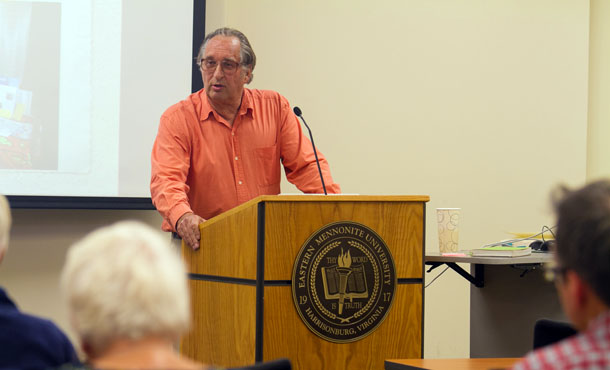A town in Iowa is named for Emir Abd el-Kader (1808-1883). The Lincoln White House sent him an honorary gift. Victor Hugo supported his release from prison. The New York Times eulogized him as “one of the few great men of the century.” And four biographies of him have been published.
Yet el-Kader, whose most recent biographer, John W. Kiser, describes as “an Arab warrior-scholar-statesman respected and admired from the Missouri Territory to Moscow to Mecca,” has little name-recognition in the West today – a situation the author of Commander of the Faithful: The Life and Times of Emir Abd el-Kader (2008), hopes to remedy.
Kiser, who organizes an annual student essay contest based on el-Kader, told an audience this week at Eastern Mennonite University that he hopes el-Kader’s life could serve as “an anti-islamophobia pill” for non-Muslims as well as “an anti-radicalization pill” for Muslim youth – citing a French Muslim former delinquent who credits el-Kader’s example with changing his life.
El-Kader grew up in the Sufi tradition, in a prominent western Algerian family. After the Ottoman Empire lost Algeria to France, el-Kader, elected chief of a tribal confederation, became an emir (“commander of the faithful”). For 15 years, he fought for Algeria’s independence.
Possible model for Muslim radicals
Kiser wrote in a September USA Today column that el-Kader’s “legacy of heroic — and honorable — resistance to Western interference in Islamic lands is a model for how Muslim nationalists today can put their region’s interests first without becoming monsters.”
Although no pacifist, el-Kader scrupulously followed what Kiser calls “Islamically correct rules” of warfare that foreshadowed the Geneva Conventions. He forbade harming civilians, decapitating enemies or mistreating prisoners. Yet when El-Kader surrendered to the French, based on the promise that he could leave Algeria freely, he and his followers were imprisoned in France. Confined indefinitely in the “cold, clammy” former castle of Henry IV, several sickened and died.
Eventually – thanks to admiration el-Kader inspired in many (including Hugo) – Napoleon III released him. Lincoln’s gift of two pistols reached him in Damascus after el-Kader had saved several thousand Christians from a rampage there.
Kiser, after a secular upbringing in New York and Chicago, became attracted to what he calls the “monastic” lifestyle at the Groton school. Holding an MBA from the University of Chicago, his first career was as a “technology broker,” heading a research firm, before a “human technology” interest sparked his writing. On his website today, he describes himself as one who has moved “from being an agnostic to a believer in the omnipresence of divine wisdom – accessible if our antennas are tuned, and requiring ceaseless effort.”
“Contrarian” books
He writes on his website about being drawn to “contrarian” book topics, beginning in 1989 with Communist Entrepreneurs, about technological innovators under Soviet rule. Soon what he calls his “unintentional Abrahamic trilogy” started with a biography of author Stefan Zweig. Next, his Monks of Tibhirine depicted harmony between Muslims and neighboring Christians despite the unsolved slayings of seven Trappist monks. Kiser calls the 2011 Oscar-nominated film Of Gods and Men, based on that book, “good as far as it goes,” but regrets it omitted episodes of kindness crossing barriers.
Kiser did most research on el-Kader in France, finding a wealth of material, though he also spent time in Algeria and Damascus.
On his website, Kiser said el-Kader combined deep religious faith with chivalrous humanism and intellectual openness. He posted these quotes from el-Kader, dated 1860:
“All the religions of the Book rest on two principals—to praise God and have compassion toward his creatures.” -and – “All creatures are part of God’s family, and those most loved by God are those who do the most good for His family.”
We’re all Muslims?
Kiser’s EMU talk sparked theological discussion among the small but lively interfaith audience. “How many of you say the Lord’s Prayer?” he asked. He then announced, “You’re all Muslims.”
Kiser offered his view that true “Islam” is not “a noun” signifying an institutional “religion,” but “a gerund” meaning, simply, “doing the work of God.” As in the Lord’s Prayer: “Thy will be done.”
Kiser cited another misunderstood Islamic term, “jihad,” as primarily meaning a spiritual struggle.
Kiser, who lives in Rappahannock County about an hour northeast of EMU, is pleased that favorable reviews have been posted on some Islamic websites and that an Arabic translation and possible film are in the works.
The essay contest for high-school and college students, which bestows awards ranging from $500 to $1,500, is based in Elkader, Iowa — named in 1846 by a country lawyer inspired by the “valiant Arab chieftan.”
EMU’s Center for Interfaith Engagement sponsored Kiser’s campus visit.
